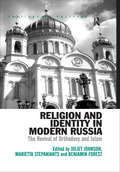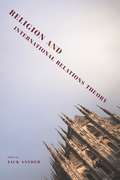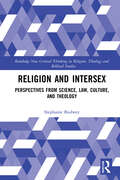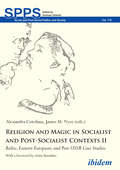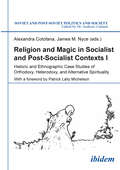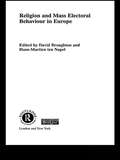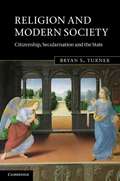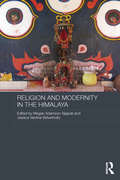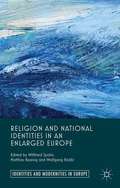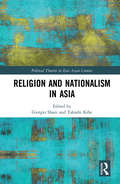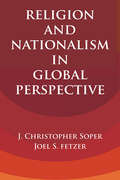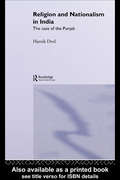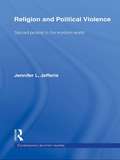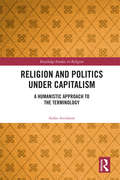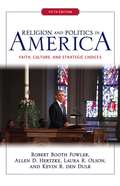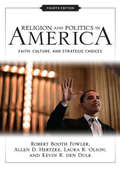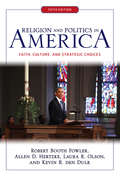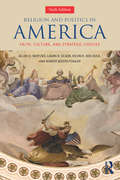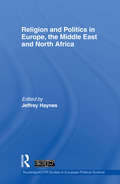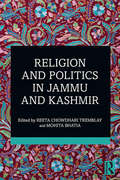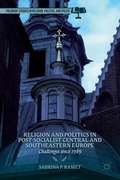- Table View
- List View
Religion and Identity in Modern Russia: The Revival of Orthodoxy and Islam (Post-Soviet Politics)
by Juliet Johnson Marietta Stepaniants Benjamin ForestFocusing on the roles of Russian Orthodoxy and Islam in constituting, challenging and changing national and ethnic identities in Russia, this study takes Tsarist and Soviet legacies into account, paying special attention to the evolution of the relationship between religious teachings and political institutions through the late 19th and 20th centuries. The volume explicitly discusses and compares the role of Russia's two major religions, Orthodoxy and Islam, in forging identity in the modern era and brings an innovative blend of sociological, historical, linguistic and geographic scholarship to the problem of post-Soviet Russian identity. This comprehensive volume is suitable for courses on post-Soviet politics, Russian studies, religion and political culture.
Religion and International Relations Theory (Religion, Culture, and Public Life #10)
by Jack SnyderReligious concerns stand at the center of international politics, yet key paradigms in international relations, namely realism, liberalism, and constructivism, barely consider religion in their analysis of political subjects. The essays in this collection rectify this. Authored by leading scholars, they introduce models that integrate religion into the study of international politics and connect religion to a rising form of populist politics in the developing world. Contributors identify religion as pervasive and distinctive, forcing a reframing of international relations theory that reinterprets traditional paradigms. One essay draws on both realism and constructivism in the examination of religious discourse and transnational networks. Another positions secularism not as the opposite of religion but as a comparable type of worldview drawing on and competing with religious ideas. With the secular state's perceived failure to address popular needs, religion has become a banner for movements that demand a more responsive government. The contributors to this volume recognize this trend and propose structural and theoretical innovations for future advances in the discipline.
Religion and Intersex: Perspectives from Science, Law, Culture, and Theology (Routledge New Critical Thinking in Religion, Theology and Biblical Studies)
by Stephanie A. BudweyThis book considers the situation of intersex people who have faced erasure in the areas of science, law, culture, and theology due to the assumption that all humans are either ‘female’ or ‘male.’ Centered in interviews conducted with German intersex Christians, this book argues that moving from a paradigm of sexual dimorphism to sexual polymorphism will help promote the full humanity and flourishing of intersex people by creating a world where intersex individuals are no longer coerced and/or forced to undergo non-consensual, medically unnecessary treatment, no longer experience human rights violations because of their lack of legal protection, no longer feel inhuman and Other due to epistemic injustice that stems from socio-cultural norms and stereotypes, are no longer told they are not made in God’s image as a result of a sexually dimorphic understanding of Genesis 1:27, and no longer feel excluded and invisible in worship services that do not recognize them. This combination of the practical and the spiritual allows for a reconsideration of the medical treatment and pastoral care that should be available to intersex people. This book will be helpful to those in the disciplines of science, law, culture, and theology, particularly those in gender and theological studies and those already in and studying for lay and ordained ministry.
Religion and Magic in Socialist and Post-Socialist Contexts II: Baltic, Eastern European, and Post-USSR Case Studies (Soviet and Post-Soviet Politics and Society #173)
by James M. Nyce Alexandra CotofanaReligion and magic have often played important roles in Baltic, Eastern European, and post-Soviet societies like those in Russia, Romania, Serbia, Latvia, Kyrgyzstan, and Estonia. Taken together, the studies presented in this collection suggest that the idea that religion and magic are connected to each other in some consistent, universal way may be nothing more than a remnant from nineteenth-century anthropology. Further, these studies challenge another part of anthropology's historical legacy: the idea that magic is something that modernity and modernization will transcend. Rather, these studies suggest instead that magic is a form of work that brings modernity into being and helps render it intelligible to those who find themselves engaged in its creation.This volume brings together historical (pre- and post-1989), ethnographic, and area studies that look at the divergent roles of state, culture, society, tradition, and the individual in enactments of magic and religion. Assessing the role magic and religion have played in the countries of Eastern Europe and beyond before and after the Cold War, it is an absorbing read for scholars of anthropology and history as well as ethnology.
Religion and Magic in Socialist and Post-Socialist Contexts: Historic and Ethnographic Case Studies of Orthodoxy, Heterodoxy, and Alternative Spirituality (Soviet and Post-Soviet Politics and Society #163)
by James M. Nyce Alexandra CotofanaReligion and magic have played important roles within Eastern European societies where social reality and sociopolitical balance may differ greatly from those in the West. Although often thought of as being two distinct, even antagonistic forces, religion and magic find ways to work together. By taking on various examples in the multicultural settings of post-Soviet and postsocialist spaces, this collection brings together diverse historical and ethnographic analyses of orthodoxy and heterodoxy from the pre- and post-1989 periods, studies on the relationship of religious and state institutions to individuals practicing alternative forms of spirituality, and examples of borderlands as spaces of ambiguity. This volume is at the crossroads of anthropology, history, as well as cultural memory studies. Its archival and field research findings help understand how repurposing religious and magic practices worked into the transition that countries in Eastern Europe and beyond have experienced after the end of the Cold War.
Religion and Mass Electoral Behaviour in Europe (Routledge/ECPR Studies in European Political Science #Vol. 19)
by David Broughton Hans-Martien Ten NapelThe onset of a new millennium has given renewed impetus to the study of religion and its place in the secular world. Religion and Mass Electoral Behaviour in Europe is an innovative, cutting-edge study, which focuses on the question of whether - and how - religion continues to influence and shape electoral behaviour across Europe. With exceptional detail, this book presents empirical data drawn from a range of country case studies to provide examples of different religious experiences and relationships.
Religion and Modern Society
by Bryan S. TurnerReligion is now high on the public agenda, with recent events focusing the world's attention on Islam in particular. This book provides a unique historical and comparative analysis of the place of religion in the emergence of modern secular society. Bryan S. Turner considers the problems of multicultural, multi-faith societies and legal pluralism in terms of citizenship and the state, with special emphasis on the problems of defining religion and the sacred in the secularisation debate. He explores a range of issues central to current debates: the secularisation thesis itself, the communications revolution, the rise of youth spirituality, feminism, piety and religious revival. Religion and Modern Society contributes to political and ethical controversies through discussions of cosmopolitanism, religion and globalisation. It concludes with a pessimistic analysis of the erosion of the social in modern society and the inability of new religions to provide 'social repair'.
Religion and Modernity in the Himalaya (Routledge Contemporary South Asia Series)
by Megan Adamson Sijapati Jessica Vantine BirkenholtzReligion has long been a powerful cultural, social, and political force in the Himalaya. Increased economic and cultural flows, growth in tourism, and new forms of governance and media, however, have brought significant changes to the religious traditions of the region in the twentieth and twenty-first centuries. This book presents detailed case studies of lived religion in the Himalaya in this context of rapid change to offer intra-regional perspectives on the ways in which lived religions are being re-configured or re-imagined. Based on original fieldwork, this book documents understudied forms of religion in the region and presents unique perspectives on the phenomenon and experience of religion, discussing why, when, and where practices, discourses, and the category of religion itself, are engaged by varying communities in the region. It yields fruitful insights into both the religious traditions and lived human experiences of Himalayan peoples in the modern era. Presenting new research and perspectives on the Himalayan region, this book should be of interest to students and scholars of South Asian Studies, Religious Studies, and Modernity.
Religion and National Identities in an Enlarged Europe
by Wolfgang Knöbl Willfried Spohn Matthias KoenigThis volume analyzes the changing relationships between religion and national identity in the course of European integration. Presenting results from cross-national comparative research on elite discourse, media debates and public opinions in Germany, Poland, Greece and Turkey from 1990-2010, it examines how accelerated European integration and Eastern enlargement have affected religious markers of collective identity. Critically engaging with secularist assumptions in the social scientific literatures on nationalism and European integration, the collection demonstrates that the Europeanization of collective identities does not necessarily imply reducing the salience of religion. Rather, the emergence of a European polity can prompt the reactive reaffirmation of religious nationalisms and lead to the re-embedding of religious components of collective identity within broader transnational frameworks. As thecontributions in this book show, explaining such changing relationships between religion and national identity requires attention to long-standing civilizational traditions, short-term dynamics of symbolic boundary-making as well as institutional trajectories of state-church-relations.
Religion and Nationalism in Asia (Political Theories in East Asian Context)
by Giorgio Shani Takashi KibeThis book re-examines the relationship between religion and nationalism in a contemporary Asian context, with a focus on East, South and South East Asia. Addressing empirical, analytical, and normative questions, it analyses selected case studies from across Asia, including China, India, Iraq, Japan, Pakistan, the Philippines and Sri Lanka and compares the differences and commonalities between the diverse configurations of nationalism and religion across the continent. It then goes on to explain reasons for the regional religious resurgence and asks, is the nation-state model, aligned with secularism, suitable for the region? Exploring the two interrelated issues of legacies and possibilities, this book also examines the relationship between nationalism and modernity, identifying possible and desirable trajectories which go beyond existing configurations of nationalism and religion. Bringing together a stellar line up of contributors in the field, Religion and Nationalism in Asia will be a valuable resource for students and scholars of Asian religion and politics as well as sociology, ethnicity, nationalism and comparative politics.
Religion and Nationalism in Global Perspective (Cambridge Studies in Social Theory, Religion and Politics)
by J. Christopher Soper Joel S. FetzerIt is difficult to imagine forces in the modern world as potent as nationalism and religion. Both provide people with a source of meaning, each has motivated individuals to carry out extraordinary acts of heroism and cruelty, and both serve as the foundation for communal and personal identity. While the subject has received both scholarly and popular attention, this distinctive book is the first comparative study to examine the origins and development of three distinct models: religious nationalism, secular nationalism, and civil-religious nationalism. Using multiple methods, the authors develop a new theoretical framework that can be applied across diverse countries and religious traditions to understand the emergence, development, and stability of different church-state arrangements over time. The work combines public opinion, constitutional, and content analysis of the United States, Israel, India, Greece, Uruguay, and Malaysia, weaving together historical and contemporary illustrations.
Religion and Nationalism in India: The Case of the Punjab (Routledge Studies in the Modern History of Asia #No.8)
by Harnik DeolThis timely and significant study explores the reasons behind the rise in Sikh militancy over the 1970s and 1980s. It also evaluates the violent response of the Indian State in fuelling and suppressing the Sikh separatist movement, resulting in a tragic sequence of events which has included the raiding of the Golden Temple at Amritsar and the assassination of Prime Minister Indira Gandhi. The book reveals the role in this movement of a section of young semi-literate Sikh peasantry who were disaffected by the Green Revolution and the commercialisation of agriculture in Punjab. Drawing on a wide range of sources, Deol examines the role of popular mass media in the revitalisation of religion during this period, and the subsequent emergence of sharper religious boundaries.
Religion and Nationalism in Soviet and East European Politics
by Sabrina P. RametReligious organizations in many countries of the communist world have served as agents for the preservation, defense, and reinforcement of nationalist feelings, and in playing this role have frequently been a source of frustration to the Communist Party elites. Although the relationship between governments and religious groups varies according to the particular country and group in question, the mosaic of these relationships constitutes a revealing picture of the political reform shaping the lives of Soviet and East European citizens.
Religion and Political Violence: Sacred Protest in the Modern World (Contemporary Terrorism Studies)
by Jennifer L. JefferisThis book uses the theory of social movements and first-hand interviews to create a new analysis of religiously motivated political violence in the modern world. Examining the movement to restore Sharia law to a dominant place in the Egyptian government, the movement to make abortion illegal in the United States, and the religious effort to secure territory in Israel, the author contends that religion becomes violent not because of ideology or political context alone, but because of the constantly evolving relationship between them. The ebb and flow of opportunities for political access ensures that secularization and religion, although polar opposites, depend on each other to define themselves. As a result, while their respective degrees of influence will inevitably undulate over time, both will remain a part of the political process for some time. Thus, a full understanding of both is critical to a meaningful understanding of the political process. Much work has been done to understand secular social movements as part of the political process, and consequentially researchers now know a great deal about the motivations, resources and timing of secular social movements. Considerably less research has been done in the field of religious social movements and this book fills that gap in the literature. This book will be of great interest to students of political violence, religion, sociology, and Politics and International Relations in general. Jennifer Jefferis is Assistant Professor in the Department of Government, Regent University, USA, and has a PhD in Political Science from Boston University.
Religion and Politics Under Capitalism: A Humanistic Approach to the Terminology (Routledge Studies in Religion)
by Stefan ArvidssonThis book relates some of the major trends within religion and politics to offer a historical framework with which to assess their interactions and a point of departure for studies to come. The study of the interrelationship between contemporary religious practice and modern politics is divided between several scholarly disciplines, all embracing different terminologies as well as multiple theoretical and philosophical premises. Such diversity of perspectives is to be welcomed, but it can inhibit the ability of academics to form a cohesive and coherent dialogue around the subject. While critically assessing the historic, sociological, political, theological and anthropological aspects of religion and politics, the book demonstrates the crucial importance of recognising the capitalist economy as the framework for understanding their dynamic relationship. Moreover, it claims that humanism is the proper lens through which to critically engage with religion in society and must be the favoured point of departure for any study within the field. This book offers a unique overarching viewpoint for of all these divergent scholarly trends and traditions. As such, it will be of significant use to academics in religious studies, political science, sociology and anthropology.
Religion and Politics in America
by Robert Booth Fowler Allen D Hertzke Kevin R. Den Dulk Laura R. OlsonReligion and politics are never far from the headlines, but their relationship remains complex and often confusing. In this fifth edition of Religion and Politics in America, the authors offer a lively, accessible, and balanced treatment of religion in American politics. They explore the historical, cultural, and legal contexts that underlie religious political engagement while also highlighting the pragmatic and strategic political realities that religious organizations and people face. Incorporating the best and most up-to-date scholarship, the authors assess the politics of Roman Catholics; evangelical, mainline, and African American Protestants; Jews; Muslims and other conventional and not-so-conventional American religious movements. The author team also examines important subjects concerning religion and its relationship to gender, race/ethnicity, and class. The fifth edition has been revised to include the 2012 elections, in particular Mitt Romney's candidacy and Mormonism, as well as a fuller assessment of the role of religion in President Obama's first term. In-depth treatment of core topics, contemporary case studies, and useful focus-study boxes, provides students with a real understanding of how religion and politics relate in practice and makes this fifth edition essential reading for courses in political science, religion, and sociology departments.
Religion and Politics in America
by Robert Booth Fowler Allen D. HertzkeReligion and politics are never far from the headlines, but their relationship remains complex and often confusing. In this significantly revised third edition ofReligion and Politics in America, the authors offer an accessible and balanced treatment of religion in American politics. They explore the historical, cultural, and legal contexts that underlie religious engagement while also highlighting the pragmatic and strategic political realities that religious organizations and people face. Incorporating the best and most up-to-date scholarship, the authors assess the politics of Roman Catholics; evangelical, mainline, and African American Protestants; Jews; Muslims and other conventional and not-so-conventional American religious movements. The work examines important subjects concerning religion and its relationship to gender, race, and class. The treatment of recent voting behavior provides an in-depth understanding for students of how religion and politics relate in practice. These core topics, along with specific contemporary case studies, useful focus-study boxes, and new emphases on Islam, Latinos, international affairs, and popular culture, further enhance this third edition for courses in political science, religion, and sociology departments.
Religion and Politics in America
by Robert Booth Fowler Allen D. Hertzke Kevin R. Den Dulk Laura R. OlsonReligion and politics are never far from the headlines, but their relationship remains complex and often confusing. Religion and Politics in America offers a lively, accessible, and balanced treatment of religion in American politics. The authors explore the historical, cultural, and legal contexts that underlie religious political engagement while also highlighting the pragmatic and strategic political realities that religious organizations and people face today. Incorporating up-to-date scholarship and analysis of voting behavior through the 2008 elections, the fourth edition assesses the politics of conventional and not-so-conventional American religious movements. Features include contemporary case studies, useful focus-study boxes, and timely discussions of Islam, Latinos, international affairs, and political culture.
Religion and Politics in America
by Robert Booth Fowler Allen D. HertzkeReligion and politics are never far from the headlines, but their relationship remains complex and often confusing. Religion and Politics in America offers a lively, accessible, and balanced treatment of religion in American politics. The authors explore the historical, cultural, and legal contexts that underlie religious political engagement while also highlighting the pragmatic and strategic political realities that religious organizations and people face today. Incorporating up-to-date scholarship and analysis of voting behavior through the 2008 elections, the fourth edition assesses the politics of conventional and not-so-conventional American religious movements. Features include contemporary case studies, useful focus-study boxes, and timely discussions of Islam, Latinos, international affairs, and political culture.
Religion and Politics in America
by Robert Booth Fowler Allen D. Hertzke Kevin R. Den Dulk Laura R. OlsonReligion and politics are never far from the headlines, but their relationship remains complex and often confusing. In this fifth edition of Religion and Politics in America, the authors offer a lively, accessible, and balanced treatment of religion in American politics. They explore the historical, cultural, and legal contexts that underlie religious political engagement while also highlighting the pragmatic and strategic political realities that religious organizations and people face. Incorporating the best and most up-to-date scholarship, the authors assess the politics of Roman Catholics; evangelical, mainline, and African American Protestants; Jews; Muslims and other conventional and not-so-conventional American religious movements. The author team also examines important subjects concerning religion and its relationship to gender, race/ethnicity, and class. The fifth edition has been revised to include the 2012 elections, in particular Mitt Romney’s candidacy and Mormonism, as well as a fuller assessment of the role of religion in President Obama’s first term. In-depth treatment of core topics, contemporary case studies, and useful focus-study boxes, provides students with a real understanding of how religion and politics relate in practice and makes this fifth edition essential reading for courses in political science, religion, and sociology departments.
Religion and Politics in America: Faith, Culture, and Strategic Choices
by Robert Booth FowlerReligion and politics are never far from the headlines, but their relationship remains complex and often confusing. In this fifth edition of Religion and Politics in America, the authors offer a lively, accessible, and balanced treatment of religion in American politics. They explore the historical, cultural, and legal contexts that underlie religious political engagement while also highlighting the pragmatic and strategic political realities that religious organizations and people face. Incorporating the best and most up-to-date scholarship, the authors assess the politics of Roman Catholics; evangelical, mainline, and African American Protestants; Jews; Muslims and other conventional and not-so-conventional American religious movements. The author team also examines important subjects concerning religion and its relationship to gender, race/ethnicity, and class. The fifth edition has been revised to include the 2012 elections, in particular Mitt Romney's candidacy and Mormonism, as well as a fuller assessment of the role of religion in President Obama's first term. In-depth treatment of core topics, contemporary case studies, and useful focus-study boxes, provides students with a real understanding of how religion and politics relate in practice and makes this fifth edition essential reading for courses in political science, religion, and sociology departments.
Religion and Politics in America: Faith, Culture, and Strategic Choices (American Theological Library Association Monograph #No. 21)
by Robert Booth Fowler Allen D. Hertzke Laura R. Olson Kevin R. den DulkReligion and politics are never far from the headlines, but their relationship remains complex and often confusing. This book offers an engaging, accessible, and balanced treatment of religion in American politics. It explores the historical, cultural, and legal contexts that motivate religious political engagement and assesses the pragmatic and strategic political realities that religious organizations and people face. Incorporating the best and most current scholarship, the authors examine the evolving politics of Roman Catholics; evangelical and mainline Protestants; African American and Latino traditions; Jews, Muslims, and other religious minorities; recent immigrants and religious "nones"; and other conventional and not-so-conventional American religious movements. New to the Sixth Edition Covers the 2016 election and assesses the role of religion from Obama to Trump Expands substantially on religion’s relationship to gender and sexuality, race, ethnicity, and class, and features the role of social media in religious mobilization Adds discussion questions at the end of every chapter, to help students gain deeper understanding of the subject Adds a new concluding chapter on the normative issues raised by religious political engagement, to stimulate lively discussions
Religion and Politics in Europe, the Middle East and North Africa (Routledge/ECPR Studies in European Political Science)
by Jeffrey HaynesIn the early twenty-first century, it is now clear that religion is increasingly influential in the political realm in ways which call into question the principles and practices of secularism. The Iranian revolution of 1978-9 marked the decisive 'reappearance' of political religion in global politics, highlighting a major development which is the subject of this edited volume. Addressing a highly salient and timely topic, this book examines the consequences of political interactions involving the state and religious actors in Christian, Muslim and Judaist contexts. Building on research, the basic premise of this text is that religious actors - including Islamist groups, the Roman Catholic and the Orthodox churches - pose various challenges for citizenship, democracy, and secularisation in Europe, the Middle East and North Africa (MENA). The key questions on which the book focuses are: Why, how, and when do religious actors seek to influence political outcomes in these regions? Providing a survey of what is happening in relation to the interaction of religion and politics, both domestically and internationally, this book will be of interest to students and scholars of politics, religion, European and Middle East studies.
Religion and Politics in Jammu and Kashmir
by Mohita Bhatia Reeta Chowdhari TremblayThis book examines the shifting, non-linear relationship between religion, nationalism and politics in the state of Jammu and Kashmir, India. In the wake of the revocation of Article 370, the state’s plural and relatively harmonious society has come under multiple strains, with religion often informing day-to-day politics. The chapters in this volume: Trace the formation of the political entity of Jammu and Kashmir and the seemingly secular politics of its three regions Discuss the rise of militancy and resistance movements in the Kashmir Valley Highlight the intersection between everyday life, nationalism and resistance through a study of the literary traditions of Kashmir, contemporary resistance photography and everyday communalism located in the changing food practices of Hindu and Muslim communities Religion and Politics in Jammu and Kashmir will be an indispensable read for students and researchers of religion and politics, democratization and democracy, secularism, sociology, cultural studies and South Asian studies.
Religion and Politics in Post-Socialist Central and Southeastern Europe
by Sabrina P. RametThis volume examines the political engagement of religious associations in the post-socialist countries of Central and Southeastern Europe, with a focus on revelations about the collaboration of clergy with the communist-era secret police, intolerance, and controversies about the inclusion of religious instruction in the schools.
